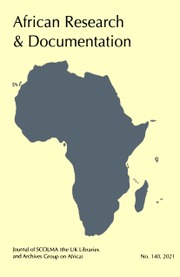No CrossRef data available.
Article contents
African Studies Research in Mozambique
Published online by Cambridge University Press: 25 April 2022
Extract
The Centro de Estudos Africanos (Centre of African Studies - henceforth CEA) was founded soon after Mozambique's independence in June 1975. It was set up under the directorship of Aquino de Bragança, who was formerly Secretary to the Conference of Nationalist Organisations in the Portuguese Colonies, that linked together all the lusophone liberation movements during the anti-colonial struggle. From its inception the C.E.A. had two high priorities - a committment to collective research and to studies vhich would te relevant to the needs of Mozambique in its attempt to build a socialist society. The latter was not seen simply in narrow nationalistic terms, but was placed firmly within the regional context. Hence, the first major study carried out was on the political economy of Zimbabwe as a background document to the Geneva talks of 1976.
- Type
- Research Article
- Information
- Copyright
- Copyright © International African Institute 1982
References
Notes
1. Zimbabwe: notes and reflections on the Rhodesian question, CEA, Maputo, 1976, 47p. This-study was subsequently published in book form as A Questão Rodesiana, Lisbon, Iniciativas Editorials, 1978, lllp ; and in the journals Politica Internazionale (1) 1980, pp 42-56 and Tiers Monde (77), 1979, pp 79-118.
2. The Mozambican miner: a study in the export of labour CEA, Maputo, 1977, 153p plus appendixes.
3. Black Gold, Hassocks, Harvester Press, 1983.
4. Relatório provisório sobre o desemprego no Maputo, CEA, Maputo, 1978, 41p (only available in Portuguese).
5. Wuyts, Marc, Peasants and rural economy in Mozambique, CEA, Maputo, 1978 39p.Google Scholar
6. Wuyts, M, On the question of mechanisation of Mozambican agriculture today, CEA, Maputo, 1979, 34pGoogle Scholar. See also by this author “The Mechanization of Present Day Mozambican Agriculture”, in Development and Change, vol 13, No. 1, 1981Google Scholar.
7. Cotton production in Mozambique: a survey, 1936-1979, CEA, Maputo, 1981 79p. A number of other studies on cotton are only available in Portuguese.
8. See “The Constellation of Southern African States: A New Strategic Offensive by South Africa”, republished in the Review of African Political Economy, No 18, 1980, pp 102-105. Also Re-structuring the Southern African Region: Research Support for the SADCC Strategy, a paper, given at the Consultative Workshop on Research Priorities in Southern Africa, Roma, Lesotho, November 1981. See also a paper produced for the UNESCO Conference hosted by the CEA held in Maputo in August 1982.
9. For an analysis of this, see Munslow, B, “Disengagement from a Regional Sub-System: Problems and Prospects” in Journal of Area Studies, No. 4. Autumn 1981CrossRefGoogle Scholar
10. See for example articles in Estudos Moçamblcanos, No. 2, February 1981
11. See “Nãb Vamos Esquecer”, Boletim-Informativo Da Oficina De História, No. 1, CEA, Maputo, February 1982. In English, see Towards a History of the National Liberation Struggle in Mozambique: Problematics, methodologies, analyses, a paper given at the Experts Meeting on Problems and Priorities in Social Science Training in Southern Africa, UNESCO, Maputo, August 1982.
12. CEA, Strategies of Social Research in Mozambique: The Case of the Centre of African Studies, a paper given at the Consultative Workshop on Research Priorities in Southern Africa, Roma, Lesotho, Novemter 1981.
13. Munslow, B, Mozambique: the Revolution and its Origins, London, Longman, 1983Google Scholar, A Isaacman. Twentieth Century Mozambican History; and Saul, J (ed) Mozambique, New York, Monthly Review Press, 1983Google Scholar.


